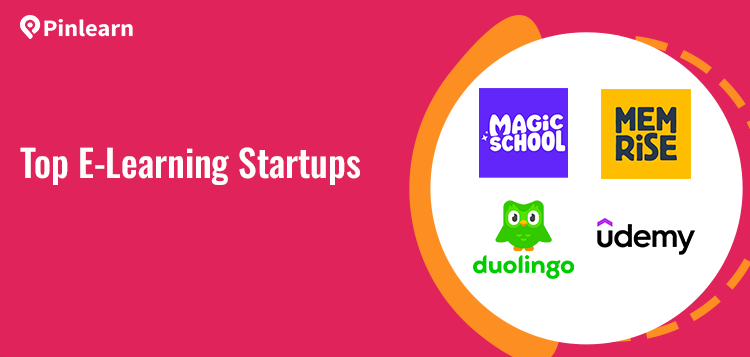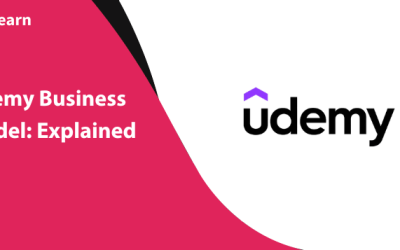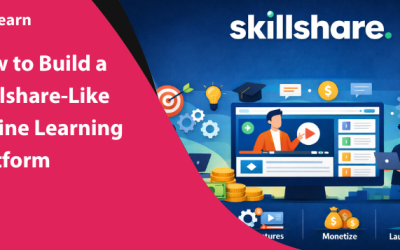13 Top E-Learning Startups to Watch in 2026
The e-learning industry is constantly evolving, and it’s crucial to stay adept with the latest developments. More businesses and schools are turning to online learning. Several leading e-learning platforms are taking the stage. Hence, deciding on the right learning solution is becoming more challenging.
To make things easier, here’s our curated list of the best 13 e-learning startups defining the industry narrative! So, dive into it straight away!
13 Best E-learning Startups Taking the Stage
Here’s a complete list of startups disrupting the education space:
AI-Driven Learning
1. Dreambox Learning
The first e-learning startup in this list is Dreambox Learning. Founded in 2006, it is an American startup focused on maths and reading for K-8 students. It creates personalized learning paths tailored to diverse learning styles, student progress, and individual needs.
Dreambox Math(K-8) includes formative assessments, engaging activities, and data-driven tools. Dreambox Reading (K-12) is an age-appropriate program designed to enhance reading, comprehension, and vocabulary skills. Its algorithm recommends lessons by evaluating a student’s reading level.
These adaptive programs are for educators and families. To date, Dreambox has secured approximately $150 million in funding.
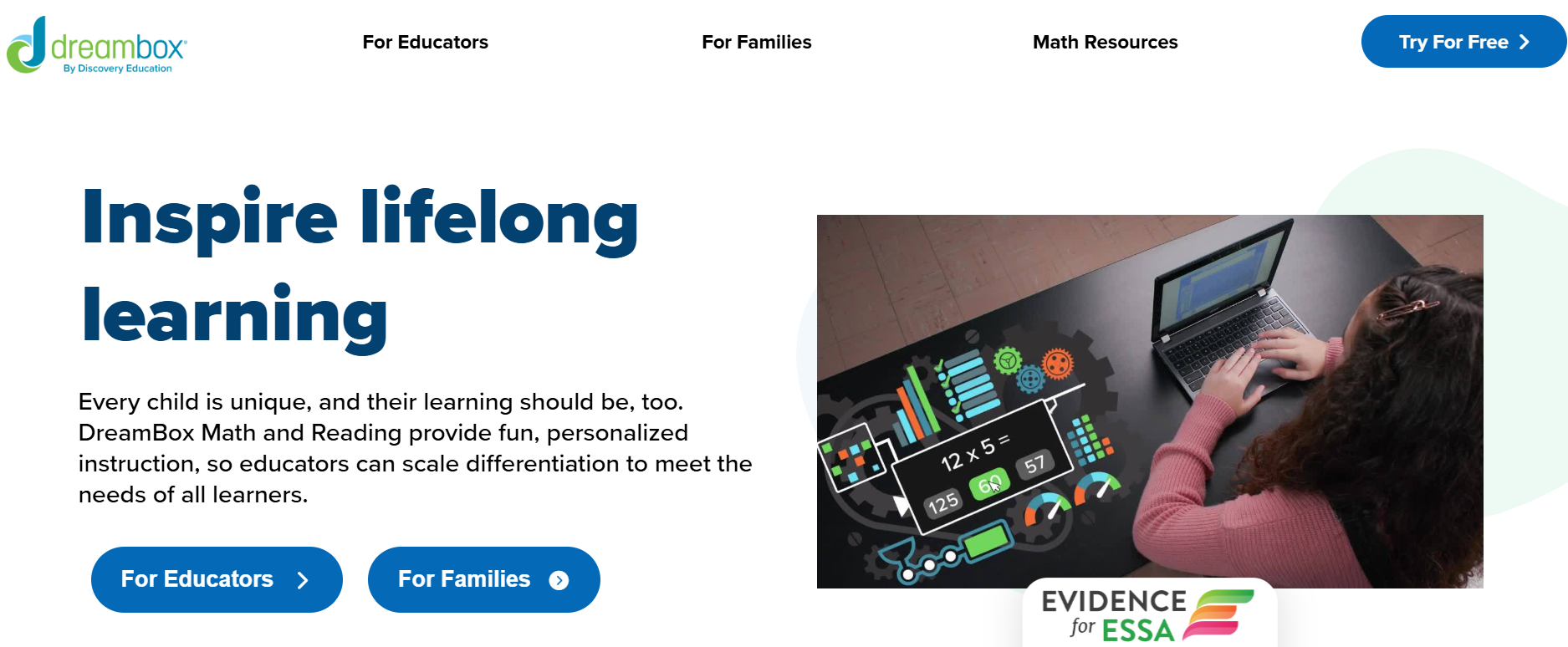
Global Impact & Reach:
It is headquartered in Bellevue, Washington. And offers learning programs to over 6 million students. Several schools in the United States and Canada utilize Dreambox Learning.
Target Audience:
Students between 5 – 14 years who want to improve math and reading skills. The programs are designed for both families and educators.
Highlights:
- Personalized learning paths
- Adaptive learning engine
- Engaging curriculum for clearing concepts and critical skills
- Formative assessment for student progress
- User-friendly with visuals and tools
- Teacher dashboard & analytics
- Parental tools for homeschooling
2. Riid
Another leading AI-based tutor startup, Riid, has topped the CB Insights AI 100 list. Established in 2014, the South Korean company is known for its creative disruption in the edtech industry.
Deep-learning algorithms power its first AI-tutor solution. Riid is transforming the language learning and test preparation space with real-time feedback. As learners progress, the AI engine suggests daily and weekly study plans. Thus, offering better learning experiences and outcomes.
Riid’s USP product is the Santa test app for TOEIC test prep. The startup also partners with educational institutes to implement its AI model in learning. These are typically SAT and GMAT-based training programs.

Global Impact & Reach:
Based in South Korea, Riid has earned a total of $250 million in funding. It has expanded across North America(Riid Labs), Brazil, Middle-east and Asia.
Remarkable milestones:
- Santa – An AI TOEIC solution with over 4 million users
- EdNet – It is the World’s largest Artificial Intelligence in Education Dataset. And has gathered essential AI interactions over 2 years
- $175 million Softbank Funding – Closed its funding rounds with a massive $175 million from banking giant
- R.test – Launched an adaptive SAT and ACT assessment platform in 2023
- OE Saber – AI-powered mobile app for Saber 11 test (high school exit paper test in Columbia)
Target Audience:
Students preparing for English language proficiency tests like TOEIC, SAT, GMAT
Highlights:
Riid’s AI-based tutor solution features:
- AI-powered adaptive learning (tailored study plans)
- Real-time performance tracking tool
- Teacher support tools for quizzes and progress tracking
- Blockchain-based reward system
3. Elicit
If you’re into research, you know how time-consuming tasks could delay your academic papers. That’s when Elicit makes work easier for researchers! Trusted by researchers at Google, Stanford, and The World Bank, Elicit is a go-to AI Research Assistant.
Its main goal is to automate extensive research tasks. From summarizing papers and extracting data to interpreting evidence, Elicit is a trusted research guide. The language model finds research papers without exact key phrases.
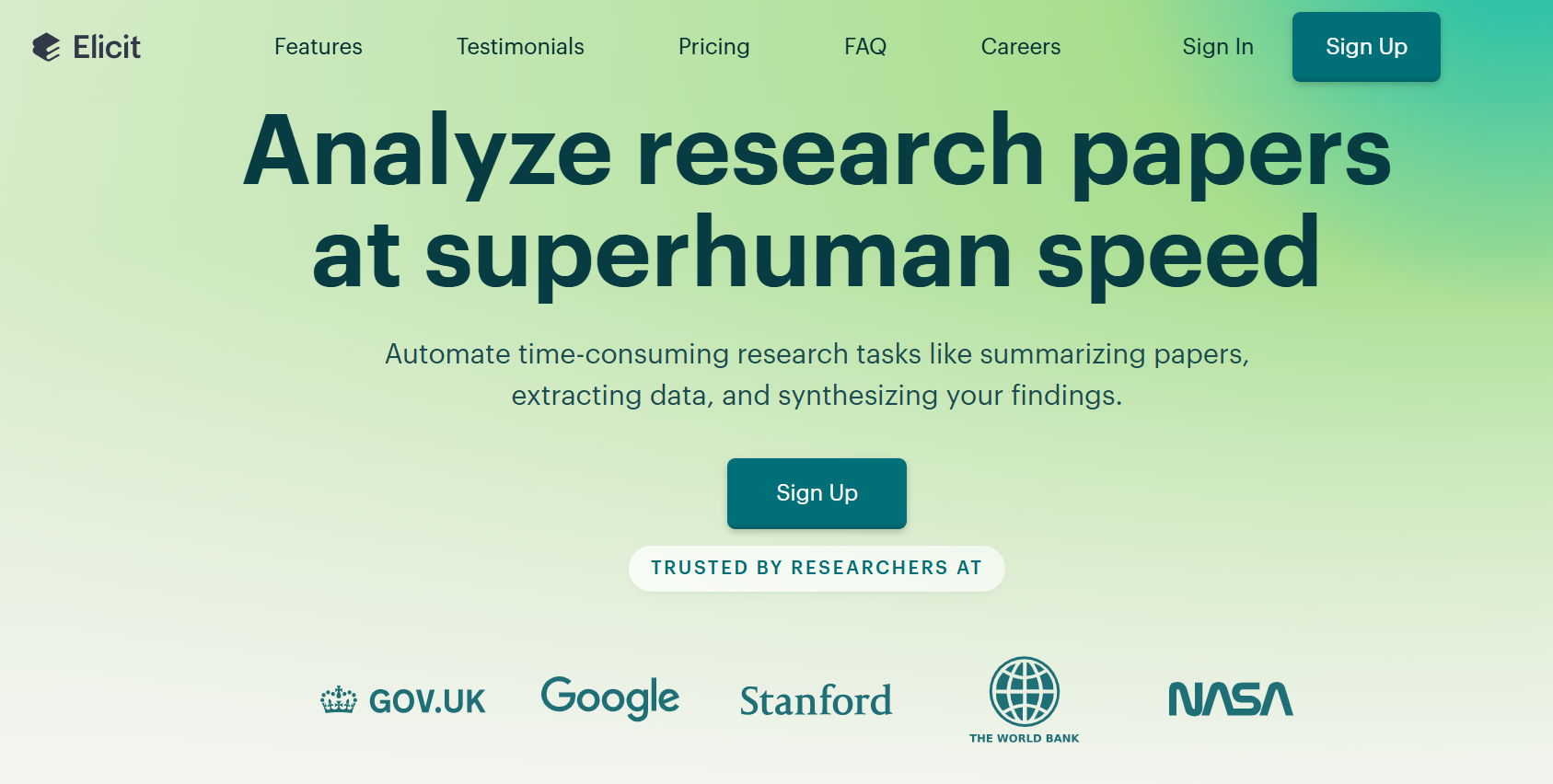
Global Impact & Reach:
Headquartered in Oakland, Elicit is used by over 40,000 researchers monthly. Recently, Elicit raised $22 million in funding. This raises its existing $100 million valuation.
Target Audience:
Academic users, graduate students, scientists, and policymakers
Highlights:
- Automated research reports
- Unlimited search across research papers
- Extract and organize data
- Ask questions on papers
- Synthesize evidence
- Upload & analyze PDF
- Export data into CSV files
4. Magic School AI
Magic School AI is a reliable AI educational platform to simplify teaching tasks. Launched in 2023, it is adopted by every U.S. district and across 160 countries.
So, what’s so magical about the platform? To start with, it offers 80+ teacher tools to ease teaching and learning.
Develop tailored lesson plans, assessments, or academic content with guided prompts. Result? Teachers save nearly 7+ hours weekly and avoid burnout. All while improving student outcomes and driving productivity.
Besides educators, schools and districts trust Magic School’s powerful interface. This helps them with customizations, analytics, and training.
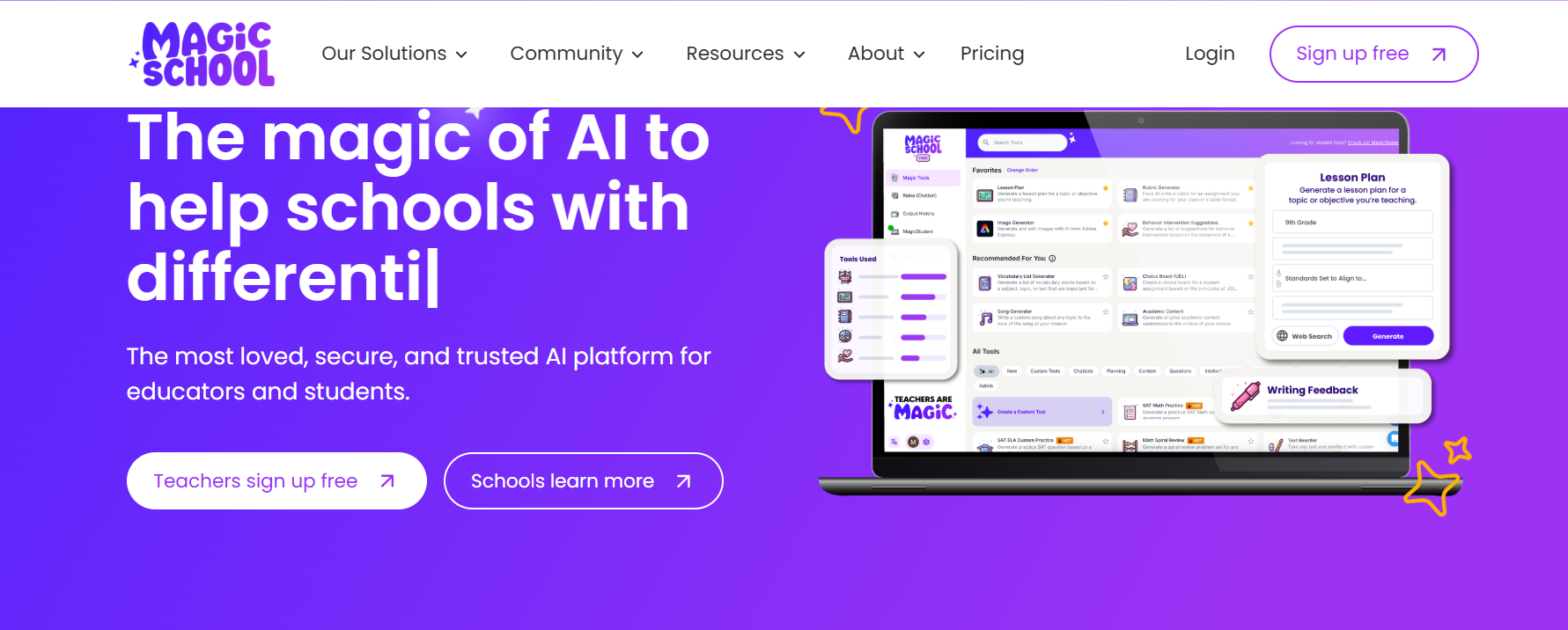
Global Impact & Reach:
Magic School AI has 5 million registered educators. It is widely adopted by 13,000 schools & districts in 160 countries.
Target Audience:
Educators, students, schools & districts
Highlights:
- AI-driven lesson planning
- Adaptive instructor tools
- Generate assessments
- Customize chatbots and tool access based on district needs
- Certification & training
- LMS integrations with Google Classroom, SSO, etc
- Exports to Google Docs, Microsoft Word
- Privacy & Compliance Settings
Massive Open Online Course
1. Udacity
The first MOOC to reach unicorn status, Udacity is still a titan in the industry. It primarily focuses on tech skills and is a for-profit platform. Learners can explore courses in technology, business, and data science.
Rewind to 2011, Udacity originated as an outgrowth of free computer science courses offered by Stanford University.
Nanodegree programs are its most prominent courses. Now, the platform has largely stopped its free course approach. It offers both subscriptions, bundles and individual courses. Job coaching, resume guidance, and talent programs are some of its other offerings.
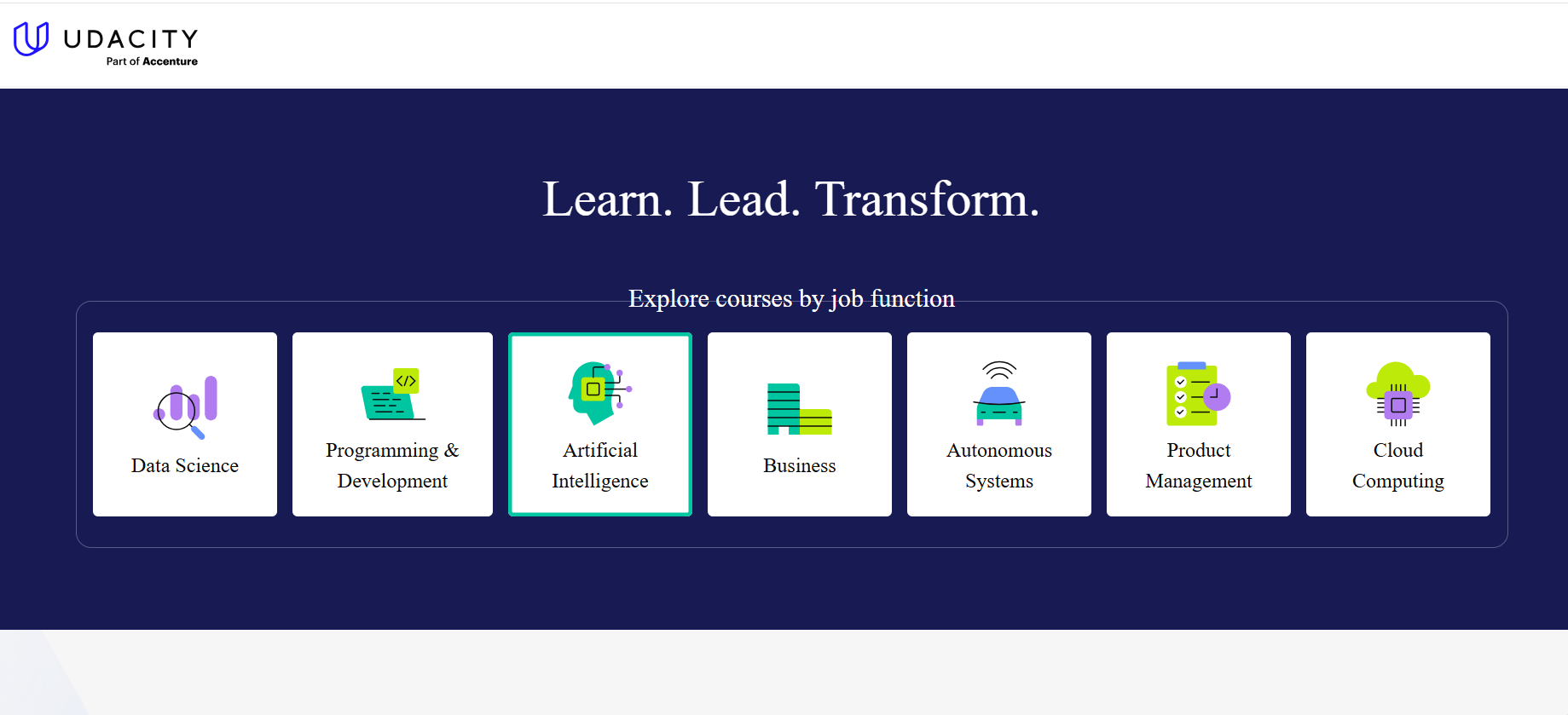
Global Impact & Reach:
Udacity has 17+ million learners spanning across 240 countries. And around 1.5 million learners have finished at least one Udacity course.
Target Audience:
Professionals building skill-based knowledge or switching careers. Also, companies & businesses who plan to train their workforce.
Highlights:
- High-quality courses & nano degrees
- Interactive & video content
- Guided projects & skill assessment
- Skill gap analysis
- Manager portals & content libraries
- Analytics & API access
- Credible certification paths
- Mobile compatibility & SSO
2. Coursera
Coursera is a blueprint in course marketplace space established in 2012. It has partnered with over 350 top-tier universities and organizations. From Yale University to Google and IBM, it offers several learning programs.
The platform’s success can be credited to its vision. This is offering world-class learning available to all.

Global Impact & Reach:
Until 2024, Coursera has amassed $694.7 million revenue. It has around 175 million registered learners and over 10,000 courses.
Target Audience:
Individuals, Enterprises, Students, Citizens & government employees
Certifications, degrees, courses, and specializations are among its offerings. Courses are in high-demand fields like data science, GenAI, and technology business.
Highlights:
Globally, Coursera stands out with key features like:
- Diverse course catalogue
- Customized learning paths
- Assessment & progress tracking
- Real-time training like guided projects and Labs
- Globally recognized certifications
⚡ Related: Coursera Business Model: How it Works?
3. Udemy
Udemy’s $787.7 million educational empire needs no introduction. But, the billion-dollar edtech company has an interesting struggle to success story.
Let’s go back to 2010. Udemy was established by Eren Bali, Gagan Biyani, and Oktay Caglar. Udemy’s business idea was turned down by 50 investors but raised $1 million in funding.
Today, it’s an e-learning giant thanks to its robust business model. Udemy is popular for its simplicity, massive audience, and diverse course, so much so that it’s synonymous with online learning.
Udemy
Global Impact & Reach:
Udemy has an impressive 80 million students and 2,60,000 courses.
Target Audience:
Udemy Standard – Professionals, students, and hobbyists
Udemy for Business – Organizations
Technology, business, art & design, fitness, and personal development are popular categories.
Highlights:
- Massive course library
- Lifetime course access
- Flexibility
- Affordable pricing
- Interactive learning tools
- Course building for instructors
- Mobile access
Tutoring Marketplace
1. Preply
Preply is a leading tutoring marketplace hosting 50,000 expert tutors for over 50 languages. English, German, Spanish, and French are popular languages on the platform.
The innovative platform uses AI matching to pair students with language tutors. The live split-screen experience creates a perfect language learning environment. Preply’s real-time lessons are a refreshing take on language learning.
The platform’s traffic plateaued in 2023. However, Preply solidified its online presence. Its winning SEO strategy included retargeting — blogs, forums, and services pages.
Preply
Global Impact & Reach:
With over 1 million learners and 50,000 tutors, Preply has impressive stats. It tutors 120 subjects in around 180 countries. Subjects include languages, academic subjects, and specialized topics.
Target Audience:
Preply’s tutoring services span across:
- Individual learners
- Professionals
- Students preparing for exams like IELTS, TOEFL, PTE, etc.
- Expats and travellers
- Corporate & businesses
Preply offers 1-on-1 lessons, group tutoring, subscription plans, and corporate training.
Highlights:
- Live Tutoring
- Virtual classroom learning tools like whiteboard, messaging,
- Flexible scheduling & pricing
- AI features like tutor matching, personal assistant
- Community support
- Broad language coverage
- Daily exercises & progress tracking
2. Wyzant
Wyzant is a key player in the tutoring industry, connecting students with expert tutors. With a network of 65,000 tutors, it offers both in-person and online tutoring services.
The leading American marketplace was established in 2005. It’s based in Chicago and boasts a huge network of expert tutors.
From academic subjects to test preparation and skill-based tutoring, Wyzant offers it all. Programming, music, arts & public speaking are few other skills learners can master.
Best of all, it recommends local tutors based on your price and availability.
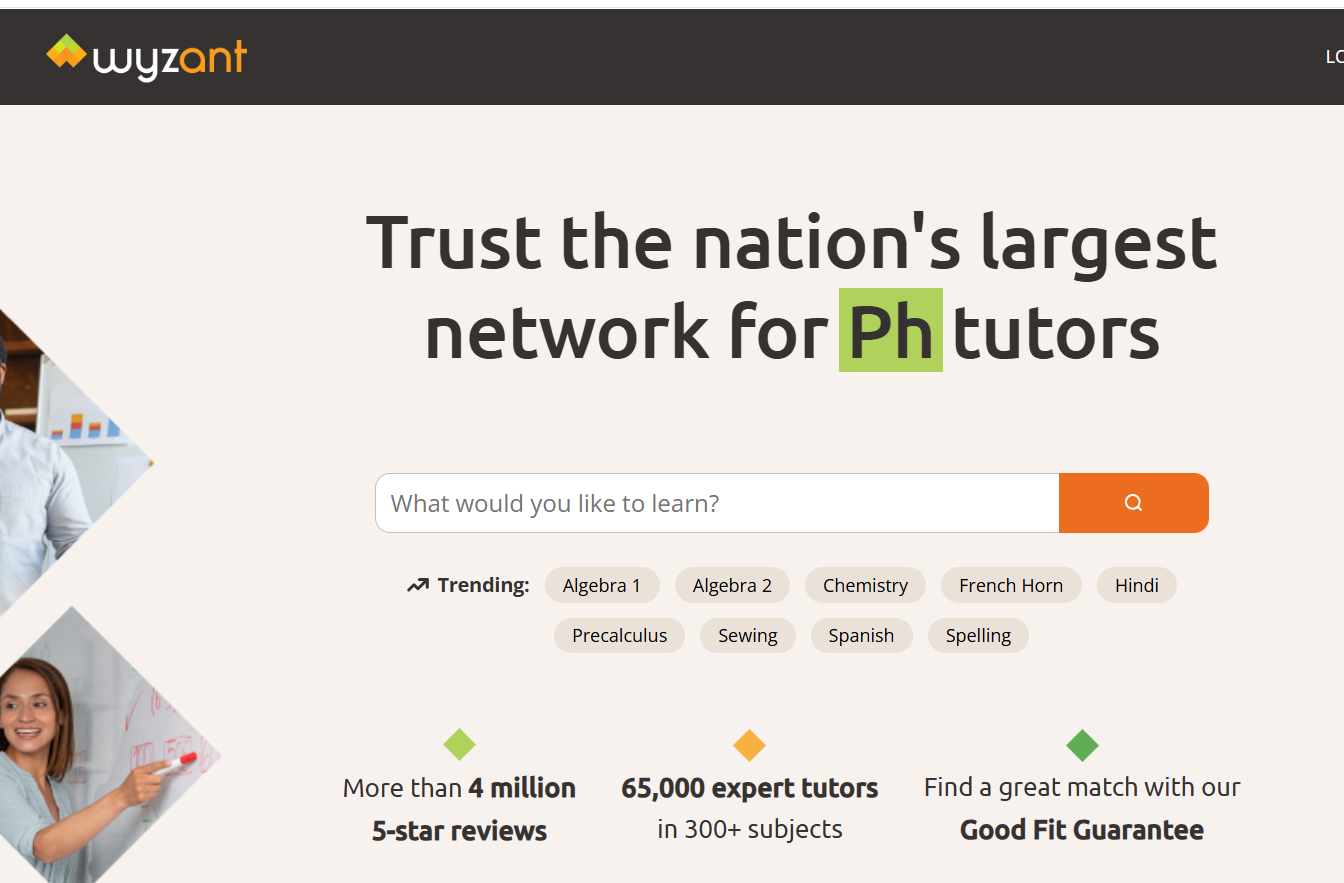
Global Reach & Impact:
Wyzant hosts 65,000 tutors tutoring across 300+ subjects. There are over 3 million students worldwide.
Target Audience:
K-12, students preparing for tests, professionals & parents
Highlights:
- Personalized learning paths
- Convenient tutor matching
- Browse & search extensive tutor profile
- Interactive tools like whiteboards, file sharing, and collaborative tools
- Flexible scheduling
- Ratings & Reviews
- Good Fit Guarantee (learners ask for a refund if not satisfied with first tutor lesson)
Language Learning
1. Duolingo
If you’re learning a language, Duolingo is one of the best apps to start your journey. With 130 million active users, Duolingo is a hot pick for language learners. All thanks to its freemium business model and viral marketing!
Duolingo was conceptualized in 2011 by university professor Luis von Ahn and one of his students. Today, it is the most popular educational app, with over 500 million downloads.
From English and French to less common ones like Welsh and Arabic, Duolingo covers 43 languages.
Its revenue model includes subscriptions, in-app purchases, and tests. Duolingo Super and Duolingo Max are two subscription plans.
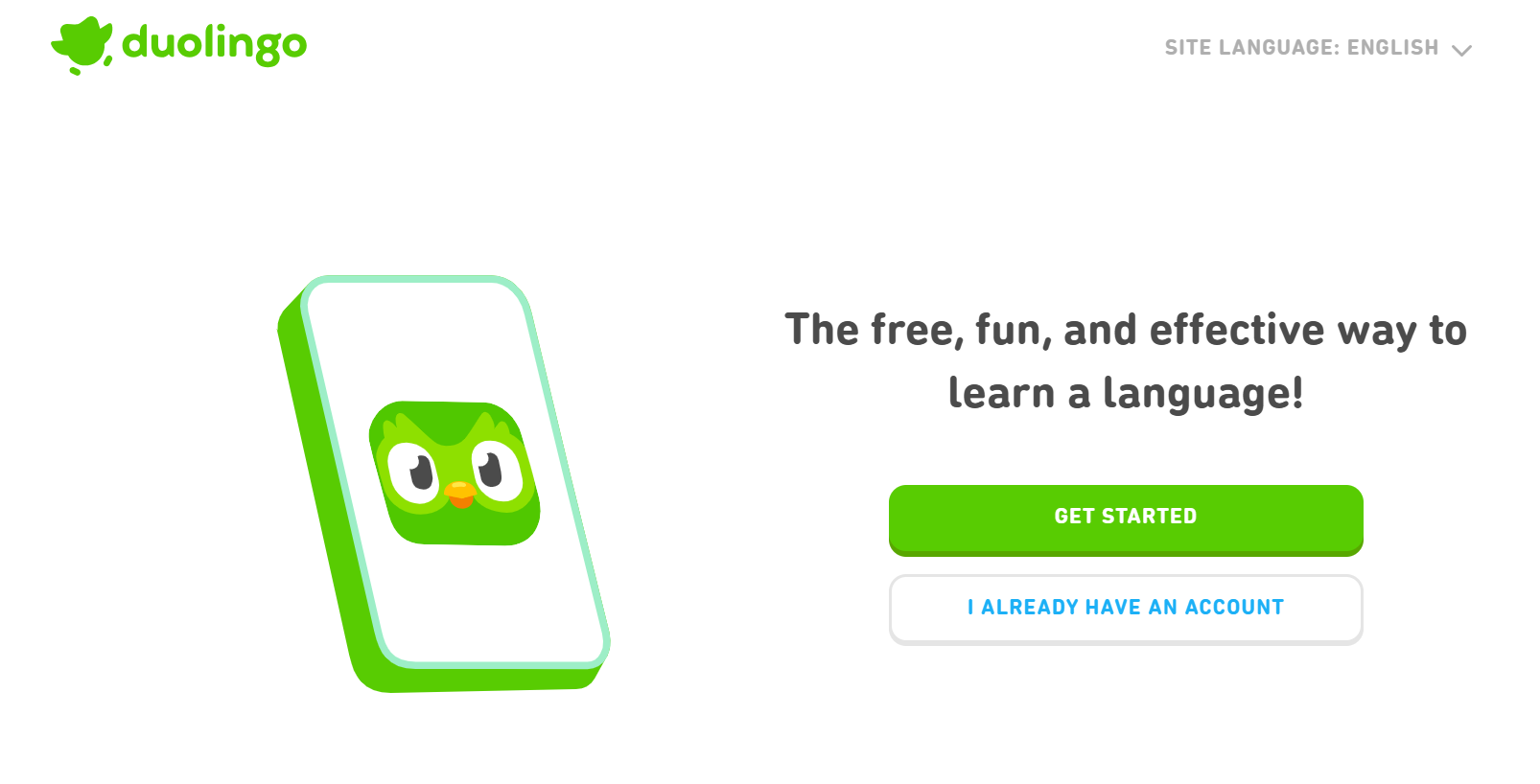
Global Impact & Reach:
World’s leading mobile learning platform with over 130 million monthly active language learners. Language courses in over 43 languages across the globe.
Actively focuses on Asia’s underpenetrated markets where English is a preferred language. Powered by AI, Duolingo has expanded to Math and Music.
Target Audience:
Students, professionals, language enthusiast, expats, immigrants, and parents
Highlights:
- Bite-sized learning lessons
- AI-powered personalized feedback
- Gamified experiences like streaks, leaderboards, challenges
- Daily goals & reminders
- Practice exercises, stories, podcasts
- Progress tracking
- Diverse language courses
2. Memrise
Here’s another platform disrupting the language learning space!
Memrise primarily focuses on flashcards and spaced repetitions. Whether polishing your Spanish tildes (accents) or tackling Mandarin, Memrise weaves a personalized learning experience. Native speaker videos, befitting visuals, and practical phrases build an engaging experience.
Its intuitive interface helps to master a language with confidence. Spaced repetition system, gamified quizzes, and Membot etch a perfect learning narrative.
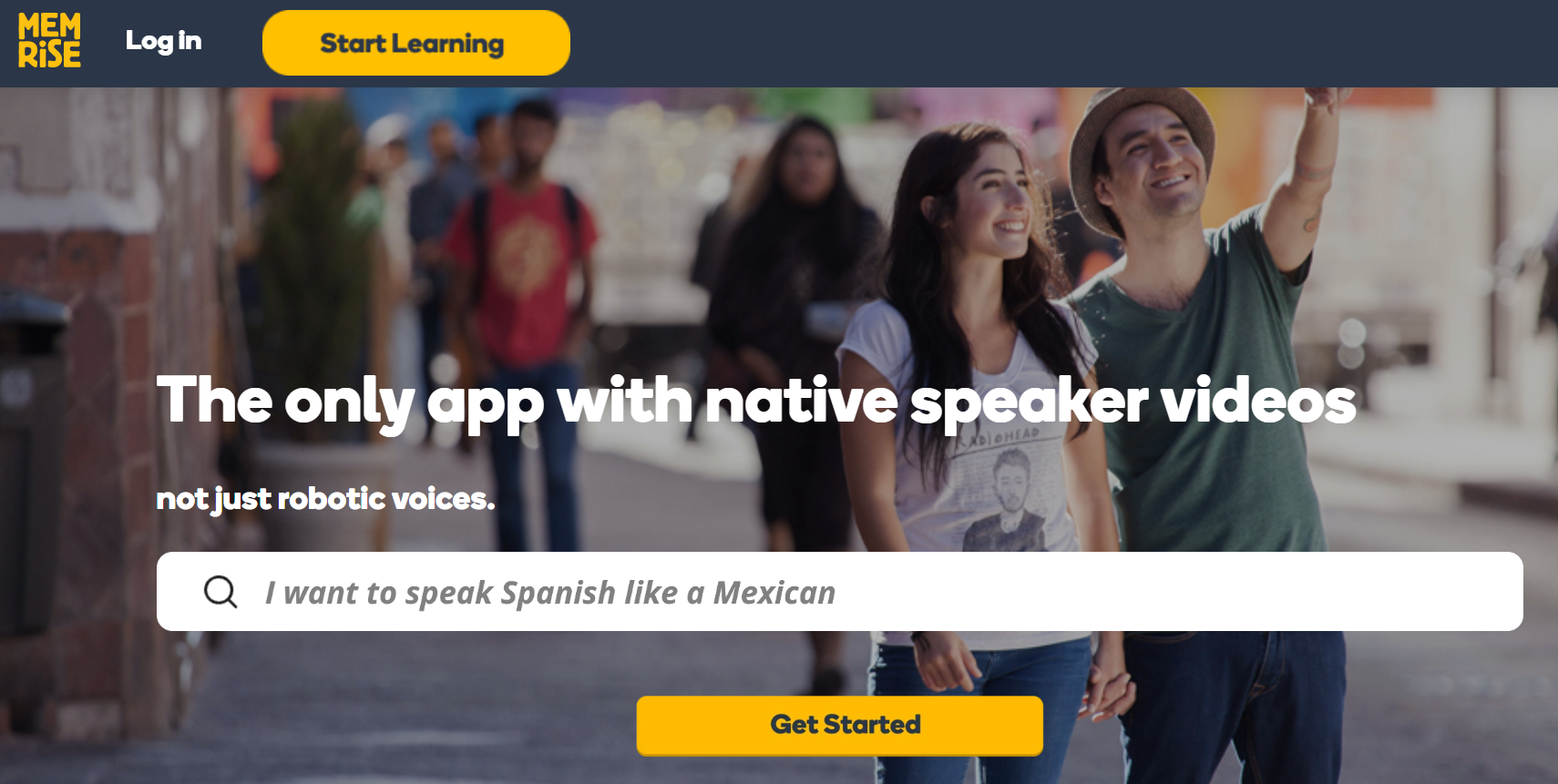
Global Impact & Reach:
Memrise has an impressive stats of 75 million users globally. This makes it one of the most popular language apps worldwide. It offers around 200 user-generated language courses. Notably, 53.21% of users are females and young adults.
Target Audience:
Students, language enthusiasts, travellers, professionals, immigrants
Highlights:
- 48,000 native learning videos
- Spaced repetition system
- Gamified learning features leaderboards and challenges
- Weekly progress tracking
- AI-powered conversational practice with Membot
- Community courses
Corporate Learning Platforms
1. Docebo
Enterprises worldwide are equipping their workforce with crucial skills and training. Corporate learning platforms like Docebo are a powerful tool helping through this transformation.
So, what’s Docebo? It is an AI-powered learning platform for employee training. From onboarding to employee training and compliance, Docebo is suited for multiple audiences.
Be it designing training programs for employees, customers, or partners. Docebo’s AI-powered features help to create, distribute, track and measure learning programs like a breeze.
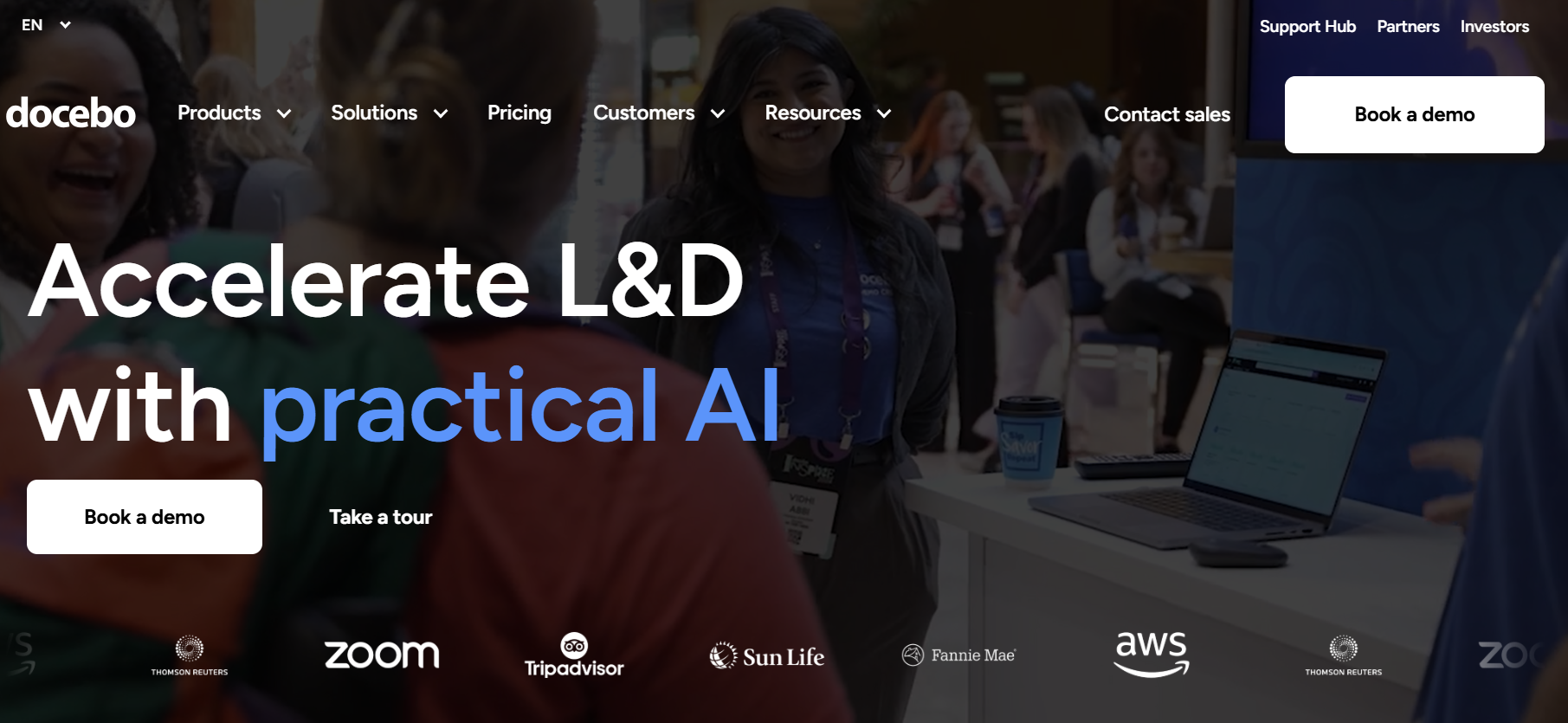
Global Impact & Reach:
Docebo LMS has over 600K learners worldwide. A trusted learning partner for over 2,000 organizations. It has offices spread across the US, Canada, Italy, Dubai, and more.
Target Audience:
Medium-to-large enterprises and global teams
Highlights:
- Leaderboards & discussions
- Customer training programs
- Excellent integrations with Salesforce, Teams
- Gamification
- Personalized learning experience for multiple audiences
- Branded learning experience
- Data & analytics features
- AI assistance in manual enrollments, content tagging, translations
2. Epignosis (Talent LMS)
Another startup designed for scripting training success, Epignosis is an award-winning LMS. It is popularly known for TalentLMS, a leading corporate training LMS.
The startup aims to — democratize learning and offers a comprehensive suite of products. TalentLMS, eFront, TalentCards, and TalentHR are a few remarkable solutions.
While TalentLMS and eFront are enterprise-grade LMS, Talentcards is a mobile-first microlearning platform. And TalentHR is a lightweight HRIS platform.
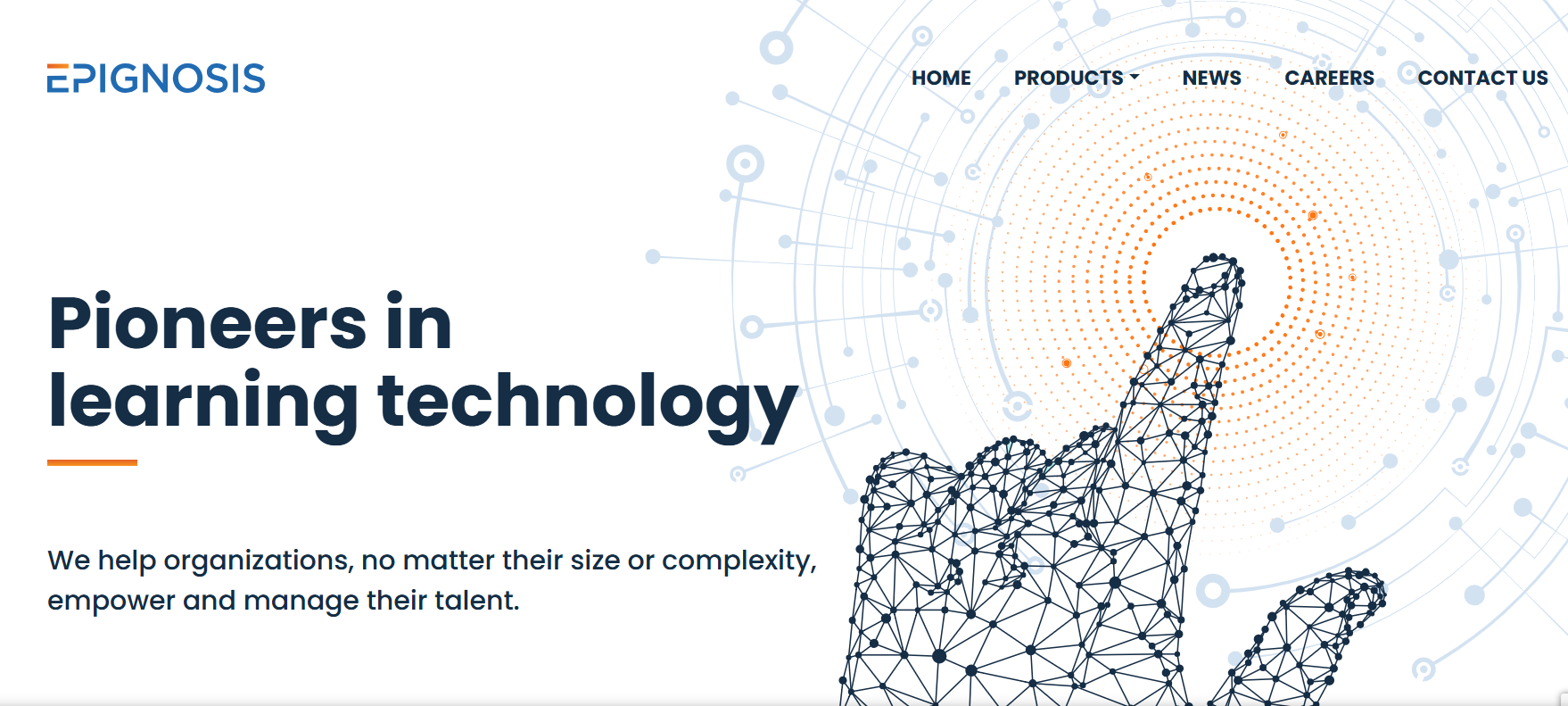
Global Impact & Reach:
Epignosis is a trusted training solution provider for 70,000 teams worldwide. It serves diverse industries: manufacturing, retail, education, and more.
Target Audience:
Each product caters to a specific segment. Small to medium-sized enterprises, large companies, HR, learning & development employees, etc.
Highlights:
- AI-powered course creation
- Gamification like badges, leaderboards, points
- Custom branding and domains
- Mobile learning
- Integrates with Salesforce, Zoom, Hubspot, etc.
Future Trends & Technologies to Look Ahead in E-Learning
With technological advancements, the e-learning industry is undergoing a tectonic shift. As educators and entrepreneurs, it’s crucial to tap into the new trends & opportunities.
Let’s see the new black in the e-learning industry:
-
AI-Powered learning
The AI wave is sweeping across every industry. And e-learning space — is no exception. From curriculum outlines to personalized learning experiences, AI is enriching the learning experience. Machine learning helps to identify student learning patterns and key insights.
-
Mobile Learning
With 7.49 billion users, embracing the mobile-first approach is crucial to stay ahead. Moreover, it offers the freedom to learn from anywhere, anytime.
-
VR and AR
AR and VR use stimulating learning environments to explain concepts better. Corporate training solutions include real-life scenarios and experiential learning.
-
Gamification
Streaks, leaderboards, and badges are making learning fun and more engaging. And language learning apps like Duolingo and Memrise are reigning this space.
-
Blockchain Technology
Whether it’s verifying degrees or ensuring data security, blockchain is no longer just a buzzword in e-learning.
Wrapping Up
We have covered all the top e-learning startups empowering the education space. These platforms are embracing technology and data to make learning accessible and easier.
From intuitive mobile apps to adaptive training solutions, e-learning is having its moment! If you are planning to step into the e-learning industry, take your first step with Pinlearn! No coding hassles or long development cycles. Set up your tutoring business with our market-ready script in weeks!
FAQ-Related to Top E-Learning Startups
1. Which are the best AI EdTech Startups to look at in 2025?
Dreambox Learning, Elicit, Riid, and Magic School AI are the top AI Edtech startups to watch in 2025.
2. Is EdTech growing?
Yes, EdTech is a continuously expanding market. The global edTech market size is valued at $250.16 billion and is expected to reach $721.15 billion by 2033.
3. What are the trends & opportunities in the edtech space?
Personalized learning, gamified learning, AI, mobile-first learning, and immersive technologies are some popular industry trends.
4. Which is the world’s most valued edTech company?
With a $15 billion valuation, Duolingo stands as the most valued edTech company. But. Byju’s (India) with $22 billion once ruled the industry.

